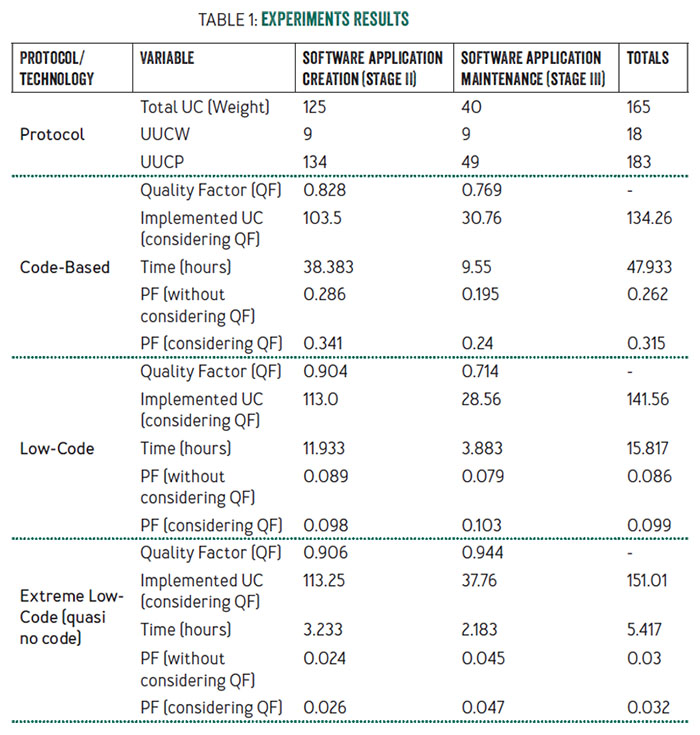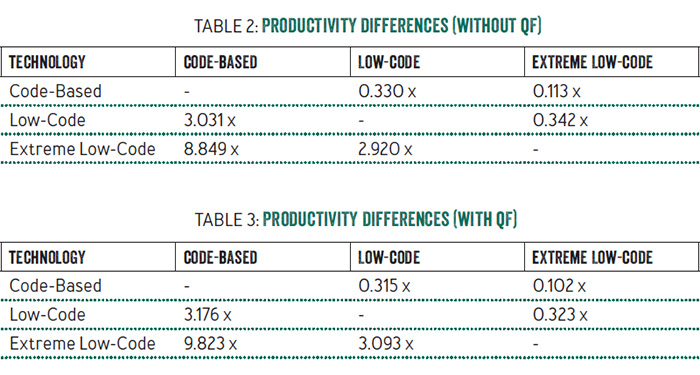Quidgest’s Genio is about 10x more productive, reveals study published in the international ACM Queue magazine
The conclusions are compiled in the scientific article “Low-code Development Productivity,” resulting from a rigorous and independent laboratory exercise in which three platforms – Django, OutSystems, and Genio – were compared in the creation and maintenance of the same software application.
The Genio platform by Quidgest was featured in the latest edition of Queue, the magazine published by the Association for Computing Machinery (ACM).
The highlight was the article “Low-code Development Productivity”, authored by researchers João Varajão (professor and researcher at the University of Minho and ALGORITMI Research Center/LASI), António Trigo (professor at the Polytechnic Institute of Coimbra and researcher at ALGORITMI Research Center/LASI/University of Minho), and Miguel Almeida (programmer and team leader at Deloitte Portugal).
The article presents the conclusions of an exercise comparing three platforms in creating and maintaining the same software application: Django (based on manual code, Python, also known as a code-based platform); OutSystems (based on a low amount of manual code, also known as a low-code platform); and Genio (based on a minimum amount of manual code, also known as an extreme low-code or quasi no-code platform).
Advantages of low-code: propaganda or reality?
As the authors mention, “This article presents one of the first research-based studies focused on productivity differences among types of development technology”. It aims to test the productivity of low-code platforms, considering that “These technologies promise significant improvements, both in terms of the development process and productivity, but evidence of these improvements is practically nonexistent in the research literature.”
Is “winter coming” for code-based technologies? Are low-code platforms indeed faster, more productive, and more efficient? Is there an advantage in automating code generation, or are these claims just “propaganda” from software vendors?
This study, pioneering in its approach by comparing different levels of coding/automation in software development platforms, helps answer these and other questions and contributes to defining the boundaries between marketing promises and the tangible results presented by some of the most well-known platforms in the market.
In the authors’ words: “This article aims to provide new insights on the subject by presenting the results of laboratory experiments carried out with code-based, low-code, and extreme low-code technologies to study differences in productivity.”
Rigorous and independent laboratory experience
The exercise, conducted rigorously and independently, was carried out by software developers with “proven proficiency” in each of the compared platforms. The laboratory experiments occurred “in a controlled environment, following a previously defined procedure and protocols to enable accurate measurements.” The study also received no funding or sponsorship from public, commercial, or non-profit domains.
After a preparatory briefing, the experience was structured in two parts: creating a software application (Part 1) and maintaining (corrective and evolutionary) that software application (Part 2), where participants were challenged to make some changes.
A researcher supervised the entire exercise, and developers were provided additional clarifications on the exercise tasks when requested.
Analysis of results and Genio’s superiority
The study used the UCPA – Use Cases Point Analysis method to test four fundamental criteria in the three software development platforms compared in the experiment: compliance with the mockups, fulfillment of the functionalities as described in the use cases, occurrence of errors, and application performance.
Quidgest’s Genio demonstrated speed, quality, and productivity in the analyzed variables:
- The Genio platform proved to be almost 10 times more productive (9.823x) than the code-based development platform and 3 times more productive (3.093x) than the low-code platform, considering the quality factor (see Table 3);
- Genio only required 5.4 hours to create and adapt the application from the exercise, compared to 47.9 hours required by the code-based platform and 15.8 hours by the low-code platform. In other words, Genio was approximately 9x and 3x faster than the code-based and low-code platforms, respectively (see Table 1);
- Genio also achieved the best values in the prolonged maintenance of the developed software, ensuring and even increasing the quality of the solution throughout its evolutionary process (see Table 1).
Study limitations mentioned by the authors
As expected in a scientific study, the authors note its limitations. First, the selected technologies do not represent “all” existing code-based, low-code, and extreme low-code technologies; many others could be part of the study. Second, the experiment protocols specify a “management software” application, with many other types of applications that could be part of the experiments. Third, the protocols for developing/maintaining the software application were designed to be implemented in a short time and individually; as software development activity is often a collaborative process, this opens the door for future studies involving longer development processes and teams. Finally, the different profiles of participants in the experiments could be a source of bias in the results.
Nonetheless, the authors also mention that, despite these limitations possibly influencing the recorded times, they do not question the conclusions, as low-code/extreme low-code technologies clearly demonstrated higher productivity levels.
Conclusions and visions for the future
Even aware that there is room for progress in this type of laboratory experiment (and many possibilities for future studies of this kind), the researchers identified some clear trends at the end of this article: “Low-code, extreme low-code, and no-code software development, supported by innovative technologies such as artificial intelligence are expected to accelerate rapidly toward worldwide adoption as major enablers of digital transformation.” The productivity differences found in these experiments clearly provide strong arguments for low-code technologies to dominate the software-development mainstream in the short/medium term.”
BERNARDO MORIM
Logistics & Asset Management Solutions Developer at Quidgest – the software developer who participated in this exercise using the Genio platform
“This study only confirms that, in some cases, spoken words are for selling, but in our case, we say it because it is proven, and we are indeed very well prepared to develop and maintain evolving software because we have very flexible templates that can be adapted very quickly to each reality – there were things that took other platforms hours, and Genio did in just minutes. Another crucial aspect that this study helps to understand is our capacity to ensure greater productivity and maintain and even elevate the quality throughout the software lifecycle.
With Genio’s evolutions since this study was conducted (embedded charts, for example), I believe that today, we would have completed the same exercise even more quickly. And, if there are new studies in the future with similar or even more complex exercises (development of an ERP), Genio is more than prepared to go to the competition again! I believe that the future of software lies in automation, extreme low-code, and generative AI – just think of the amount of legislation and new obligations that come out every week or the increasingly short delivery times… if we had to program everything by hand, it would be impossible to be competitive. But with Genio, it is possible and, with the incorporation of new functionalities elevated by language models like ChatGPT, the advantages of Genio have been multiplied.”
More information about the Genio platform here.
The article “Low-code Development Productivity” is available here.






